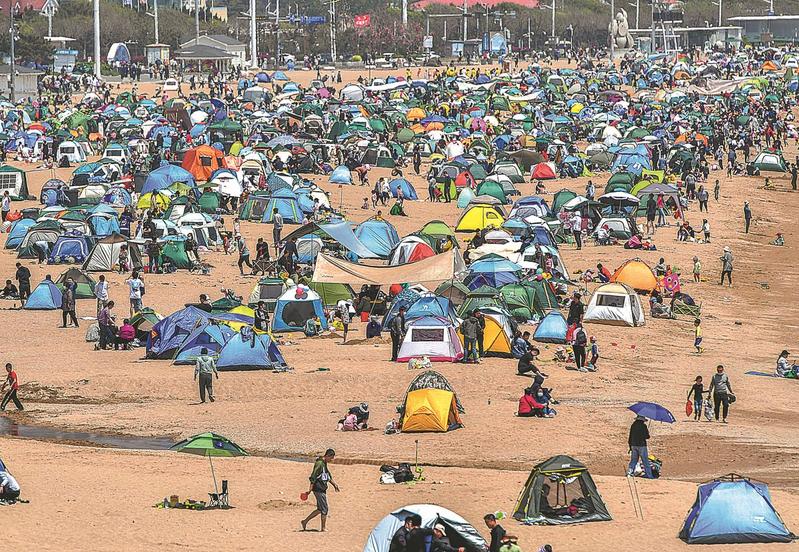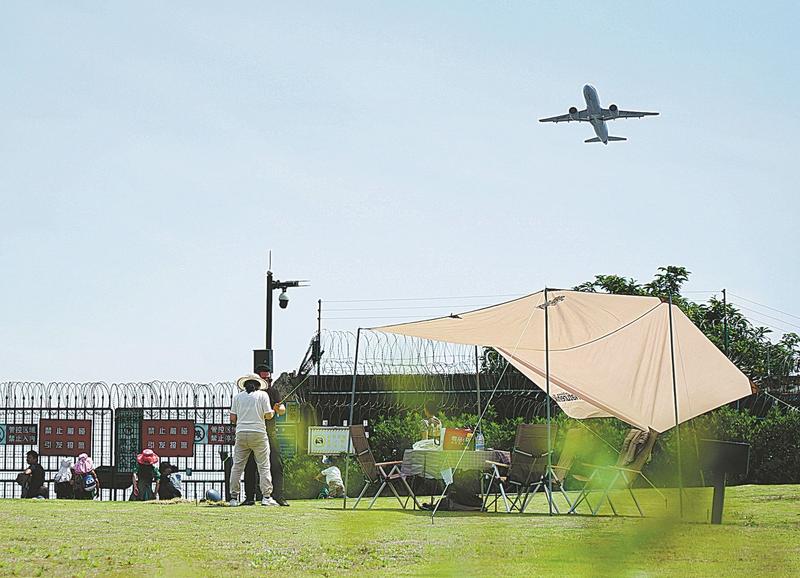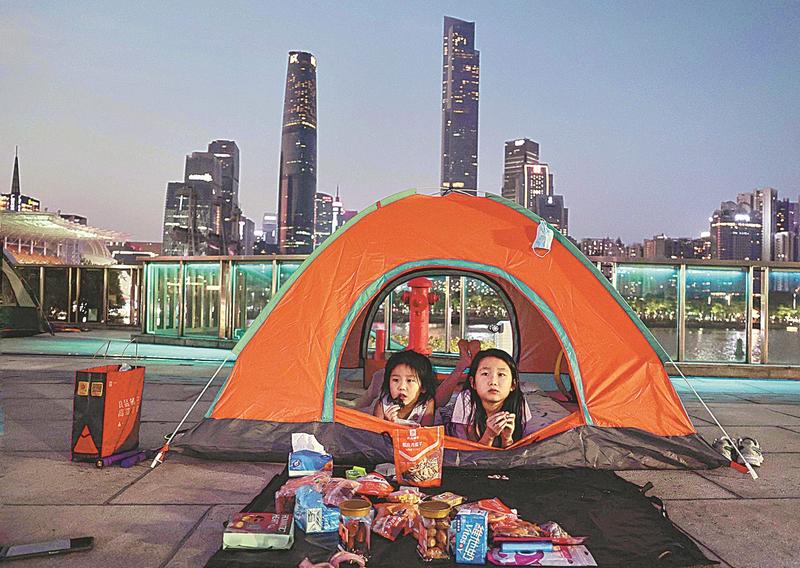Amid COVID-19 resurgence, measures to boost consumption and zest for life pay off
 People camp on a beach in Qingdao, Shandong province, during the May Day holiday this year. Camping has become popular in China as more consumers go on trips to nearby suburban regions due to restrictions on long-haul tours. (ZHAO JIANPENG / FOR CHINA DAILY)
People camp on a beach in Qingdao, Shandong province, during the May Day holiday this year. Camping has become popular in China as more consumers go on trips to nearby suburban regions due to restrictions on long-haul tours. (ZHAO JIANPENG / FOR CHINA DAILY)
Fresh COVID-19 cases in multiple cities have dimmed traditional segments of the 3.81 trillion yuan ($563.06 billion) tourism industry in China, but camping in suburban areas has emerged as a bright spot, spawning a niche business that could be worth 35.5 billion yuan in annual sales revenue this year, insiders said.
Consider these figures from Tianyancha, a corporate information provider: China already has more than 5,800 companies involved in operating camping sites. In addition, there are 33,000 tent manufacturers, more than 5,000 sleeping bag producers and over 1,200 foldable chair makers.
Besides camping, other activities like short stays at bed-and-breakfast facilities, sightseeing and visits to urban parks have also gained traction among people with never-say-die attitude, all reinforcing the fundamental role of consumption in economic development
If there are so many suppliers, there must be a huge number of consumers willing to buy their products? "China is the market to be in for outdoor fun enablers," said Ren Tian, a department director at Qunar, a Beijing-based online travel agency.
Besides camping, other activities like short stays at bed-and-breakfast facilities, sightseeing and visits to urban parks have also gained traction among people with never-say-die attitude, all reinforcing the fundamental role of consumption in economic development.
Young travelers seek high-end camping experiences complete with barbecues, bonfire parties, fireworks and much photo-taking, and demand for such fun is getting increasingly diversified, industry insiders said.
Earlier, most camping sites provided only the space and did not offer much recreation. That format, however, has become old-fashioned and less competitive. Now, sites come integrated with matching services to serve comprehensive entertainment to consumers.
As a lifestyle trend, camping spread to China from the United States and Europe, tapping outdoor activity lovers and climbers in the beginning. It gained in popularity in China after the COVID-19 outbreak in 2020, as more consumers tended to go on trips to nearby suburban regions due to restrictions on long-haul or cross-provincial tours.
ALSO READ: First C919 jet to be delivered completes maiden test flight
During the five-day May Day holiday in the first week of this month, camping erupted as the preferred outdoor activity among young consumers. Sales of admission tickets to parks that allow camping surged more than 50 percent year-on-year. Bookings for camping-related products such as accommodation tripled over the same period of last year, Qunar said.
Even regular city parks came alive with ubiquitous colorful tents of various sizes as revelers sought to beat COVID blues. Related products like approved butane stoves and mats began popping up on e-commerce platform recommendations. And new arrivals like outdoor clothing, footwear, accessories and other supplies lent fresh looks to outlets of outdoor product retailers like Decathlon. Even eateries and restaurants reported takeaway sales as campers went prepared with food and beverages to their getaways.
The growing popularity of camping in China can be seen also in the rising sales of related equipment. A number of travel agencies and gear makers are ramping up their investments. Travel agencies launched packages that integrate camping with picnics, sports, deserts or islands.
Ahead of the May Day holiday, Qunar launched an online store that focuses on providing products related to camping. The store sells different brands of products like tents, hammocks and lights for campsites. A week before the holiday, such products were all sold out, the company said.
"Camping" also emerged as the keyword with the highest online search volume on Tujia, a Chinese short-term lodging rental platform. It was followed by "flower-viewing"," picking", "mountain climbing" and "cycling".
"A large number of female consumers have taken a shine to camping, which has become more exquisite, boasting a sense of ritual. It's no longer limited to individual backpackers. Travelers care about the comfort level of camping, and they care more if they could take decent pictures at the campsites. Some lightweight and portable devices can help significantly enhance the experiences," Ren of Qunar said.
ALSO READ:Listed entities in China see highest profits in 11 years
"On Qunar, travelers can book products such as admission tickets to camping sites, camping with simple tents, camping coupled with picnics, and camping with overnight accommodations. The booking volumes of camping options that offer children's playgrounds and various outdoor gear have grown significantly," Ren said.
 May Day holiday revelers pitch a tent to watch planes take off from an airport in Chengdu, Sichuan province. (HE HAIYANG /FOR CHINA DAILY)
May Day holiday revelers pitch a tent to watch planes take off from an airport in Chengdu, Sichuan province. (HE HAIYANG /FOR CHINA DAILY)
A growing number of young female consumers, he said, post their experiences and share camping photos online.
He may have been referring to people such as Li Man, a resident of Chengdu, Sichuan province. Li booked a camping vacation for the May Day holiday in Pengzhou, a city near Chengdu in the province. She stayed there for three days.
"I booked a camping package for my family, and it included barbecues, hotpot, movie-watching and some activities for children," Li said.
In the first three months of this year, sales of large-scale tents, foldable tables, foldable chairs and sleeping bags on Tmall more than doubled year-on-year, the online marketplace of Alibaba Group said.
Before the holiday, the Ministry of Commerce said at a news conference that it would work with local commercial authorities to promote consumption, introduce targeted measures to boost consumption based on local conditions, promote the sustained recovery of consumption and ensure that consumption continues to underpin economic development.
In late April, the State Council, China's Cabinet, unveiled guidelines to further boost consumption potential and promote sustained recovery of consumption in the country.
A number of local governments issued consumption vouchers to stimulate spending.
ALSO READ:China's NEV battery output up over 180% in first 4 months
Compared with the Yangtze River Delta region and the Beijing-Tianjin-Hebei cluster, where new regional cases of the COVID-19 emerged recently, the western part of China, including Chengdu and Chongqing, and the Pearl River Delta region have seen stable control of the contagion and their residents actively taking trips.
Ahead of the holiday, Guizhou province issued cultural tourism consumption vouchers of 10 million yuan. Yunnan province issued the first phase of vouchers worth 8 million yuan, and Hainan province issued vouchers worth 5 million yuan.
Hubei Culture & Tourism Group Co Ltd said it would issue consumption vouchers with a total value of over 100 million yuan. A few cities in Zhejiang province have also issued vouchers, free admission tickets and half-price tickets to attract more travelers.
Some sightseeing spots, such as the Lushan Mountain scenic area in Jiangxi province and Tianmen Mountain in Zhangjiajie, Hunan province, offered free admission tickets to local residents, hoping to encourage residents to travel locally.
Such vouchers have significantly boosted bookings for bed-and-breakfast accommodation in many regions.
 Two girls in Guangzhou, Guangdong province, enjoy a family outing at a popular viewing spot. (XIA SHIYAN/FOR CHINA DAILY)
Two girls in Guangzhou, Guangdong province, enjoy a family outing at a popular viewing spot. (XIA SHIYAN/FOR CHINA DAILY)
In Guangdong and Sichuan provinces, the average booking volumes of B&B during the May Day holiday surged 16 times compared with the previous week, Tujia said.
"B&B homestay serves as an important consumption scenario, and many B&B owners tend to offer enriched activities in nearby regions for their guests. B&B can also help stimulate consumption of other sectors such as catering and nearby scenic spots," said Hu Yang, vice-president of Tujia.
"Tourism vouchers aim to encourage local residents to take short trips in their own regions, which can help toward consumption growth," Hu said.
During the May Day holiday, the average price of hotel rooms nationwide hit a five-year low. In Beijing, Chongqing, Chengdu, Hangzhou of Zhejiang province and Sanya of Hainan province, the booking price of some luxury hotel rooms was only half of what it was in the same period last year. The average price of flight tickets dropped 25 percent year-on-year, Qunar said.
Meanwhile, travelers booked train tickets within their regions of residence. During the holiday, the booking volumes of train tickets between Shenzhen and Guangzhou of Guangdong province, and those between Chengdu and Chongqing, were the highest, said Tongcheng Travel, a Suzhou-based online travel agency.
"Although the pandemic has had a temporary negative impact on consumer confidence, thereby affecting their willingness to go on trips, and some regions have limited the travel of students, going somewhere nearby still remains the choice of many families during holidays. Thus, sightseeing spots in surrounding areas and urban parks have become their best choices," said Zhang Mingyang, a senior researcher at Tongcheng Travel.


